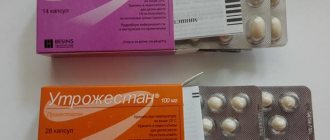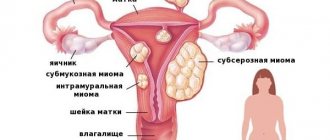Date of publication: 06/23/2017
Among gynecological problems, endometriosis is a fairly common disease. Quite a lot of drugs have been developed and used for its treatment, however, Utrozhestan for endometriosis is considered one of the most effective drugs.
It is prescribed only after consulting a doctor and making an accurate diagnosis. Treatment of endometriosis can be quite lengthy, and its effectiveness depends on following all the doctor’s recommendations and taking specific medications, in particular Utrozhestan.
Active components and principle of action on the body
Utrozhestan has a wide spectrum of effects on the female body, which is achieved thanks to its active components of plant origin:
- soy lecithin – normalizes cellular metabolic processes, restores the condition of nerve fibers;
- glycerol – is responsible for maintaining the nutrient metabolism process at the proper level;
- titanium dioxide – stabilizes lecithin and glycerol.
Additional substances of the drug: gelatin, which makes up the capsule shell, peanut oil, which promotes active absorption of the main components by the gastrointestinal tract. The advantage of a hormonal drug is its uniform and rapid absorption into the circulatory system and distribution through the bloodstream throughout the body.
The drug acts on the organs of the female reproductive system in the following way - the active components of the drug promote the process of transition of the proliferative phase of the mucous layer of the uterine cavity into the secretory stage, which promotes the process of fertilization and normal attachment of the amniotic egg.
Who needs this property of Utrozhestan? Women who, due to the development of endometriosis, cannot conceive a child, and IVF attempts end in spontaneous abortion. The drug helps to quickly relieve the unpleasant and painful symptomatic picture of endometriosis - abdominal pain, heavy discharge, bleeding in the middle of the cycle.
How natural progesterone works
Micronized progesterone in Utrozhestan is completely identical to the natural hormone of the corpus luteum. Once in the body, it binds to receptors on the surface of cells in target organs. In our case, we are talking about the endometrium - the mucous membrane of the uterus.
Utrozhestan affects the genetic apparatus of the cell: it activates DNA and stimulates the production of RNA. It affects the endometrium, changing its structure:
- Promotes the transition of the mucous layer of the uterus from the proliferation phase to the secretion phase;
- Prepares the endometrium for implantation of the egg in the second phase of the menstrual cycle;
- Reduces the excitability and contractility of the uterus - creates conditions for the attachment of the fertilized egg.
The action of micronized progesterone is aimed primarily at transforming the endometrium into the luteal phase and preparing the woman’s body for pregnancy.
Progesterone contained in Utrogestan promotes the transition of the uterine mucosa from the proliferation phase to the secretory phase.
The drug also stimulates the development of the mammary gland and initiates lactation. Therefore, Utrozhestan is prescribed for infertility and miscarriage.
Utrozhestan is practically not used in the treatment of endometriosis. It was previously assumed that progesterone in its composition suppresses excess estrogen synthesis and inhibits the growth of endometriotic lesions. Today it is known that not only hormones, but also other factors play a role in the development of endometriosis. The weak action of Utrozhestan is not enough to get rid of heterotopias and slow down their growth.
It is also useful to read: Psychosomatics of endometriosis
Clinical guidelines state progesterone drugs as a first-line treatment for endometriosis, along with COCs. But we are talking exclusively about dienogest - a hybrid gestagen. Utrozhestan is inferior to drugs based on dienogest:
- Not able to reliably suppress the growth of endometrioid heterotopias;
- Cannot relieve pain;
- Does not reduce the risk of relapse after laparoscopic surgery.
Utrozhestan has only one advantage - it stabilizes the menstrual cycle. During therapy my periods come exactly on time. But against the background of endometriosis, cycle failure and the need for its correction rarely occur.
Indications for use
Taking Utrozhestan for endometriosis is prescribed in the following cases:
- severe infertility caused by the formation of adhesions in the fallopian tubes;
- disruption of the menstrual cycle, prolonged absence or abnormal bleeding;
- frequent miscarriages due to the inability of the amniotic egg to attach to the damaged endometrial layer.
Utrozhestan 200, depending on the severity of the clinical case, is prescribed in complex therapy for the treatment of endometriosis or as an independent drug if the disease is at an early stage of development. In addition, it can be taken for prophylactic purposes to prevent relapse of the disease after conservative or surgical treatment.
Reviews about the treatment of endometriosis with Utrozhestan
Utrozhestan for endometriosis is used to correct hormonal balance and to prevent the progression of endometriotic disorders of the internal mucous membrane of the uterus. It is a highly effective drug for the treatment of endometriosis.
Conclusion
- The active ingredient of the drug is progestron, an analogue of the natural hormone of the corpus luteum;
- Promotes the development of secretory phases;
- Well absorbed from the digestive tract;
- Indicated to combat endometriosis, as well as various types of hormonal imbalance;
- Has a significant number of contraindications;
- Helps prevent the development of endometriosis.
Under what circumstances is it recommended to consult a doctor?
It is necessary to consult a specialist if:
- severe bleeding;
- abdominal pain;
- infertility, provided that regular sex life is maintained;
- menstrual dysfunction.
What is the medicine Utrozhestan
Utrozhestan (Duphaston) is a hormonal drug in the form of soft capsules with a gelatin shell. Inside there is a soft, whitish homogeneous substance. Has a gestagenic effect.
Active components and principle of action on the body
Progesterone development of the secretory phase of the ovary. After fertilization, it promotes the transition to a favorable state necessary for the normal development of the fertilized egg.
After oral administration, progesterone levels slowly increase. Disintegrates in the body to inactive metabolites.
With vaginal administration, penetration of the active drug into the blood occurs already at the beginning of the first hour. With this method of application, the same metabolites are formed. It is evacuated from the body mainly through the kidneys.
Indications for use of Utrozhestan for endometriosis
The drug is indicated in the following cases:
- infertility caused by the progression of endometriosis;
- pathological disturbance of the monthly cycle;
- insufficient production of progesterone by the female reproductive glands;
- preservation of gestation when a miscarriage has already begun;
- preventing the progression of endometriosis with increased estrogen production;
- treatment of adenomyosis (only in case of complex therapy).
Contraindications for use
Utrozhestan is not prescribed in the following cases:
- bloody issues;
- bleeding from the uterine cavity;
- functional disorders of the liver;
- tendency to form blood clots;
- tendency to intensive formation of blood clots;
- benign neoplasms that threaten to develop into cancer;
- severe stage of mastopathy;
- incomplete termination of pregnancy;
- renal failure;
- individual intolerance to hormone analogues.
Adverse reactions when taking Utrozhestan
During therapy, the following undesirable effects may appear (subject to oral administration):
- decreased concentration;
- severe drowsiness;
- syncope;
- thick discharge between menstrual cycles;
- allergic responses to the ingredients of Utrozhestan;
- nausea.
In case of vaginal use, no side effects are detected.
Pregnancy and breastfeeding period
Carrying and breastfeeding a child are not contraindications for taking Utrozhestan. The drug is prescribed with extreme caution in the third trimester of pregnancy.
Source: https://endometriy.com/endometrioz/utrozhestan
Contraindications for use
Despite the effectiveness of Utrozhestan in the treatment of endometriosis and minimal risks of developing side symptoms, there are a number of contraindications, the presence of which in a woman makes it impossible to take it:
- the presence of malignant neoplasms in the mammary glands;
- thrombophlebia;
- liver diseases occurring in the active stage;
- diseases of the circulatory system, characterized by a rapid clotting process, which increases the risk of blood clots forming in the blood vessels.
It is forbidden to take Utrozhestan if you have an allergic reaction or individual intolerance to certain components of the drug.
Release form and composition
"Utrozhestan" is produced in the form of round, soft, shiny yellowish gelatin capsules. Their contents are a whitish oily homogeneous suspension in which there is no obvious phase separation. The active substance is micronized natural progesterone. One capsule contains 100 milligrams.
Auxiliary components: peanut oil, soy lecithin, glycerol, gelatin, titanium dioxide.
But for endometriosis, Utrozhestan 200 mg is the ideal dosage. This medication is available in the form of soft oval, shiny, yellowish gelatin capsules. Their contents are similar. One capsule contains 200 milligrams of micronized natural progesterone. The excipients are the same.
Why is the treatment of endometriosis with Utrozhestan so popular?
Possible complications
Side effects from the use of Utrozhestan are rare. Their appearance is associated in most cases with improper use of the drug, or exceeding the dosage prescribed by the doctor.
The following complications may occur:
- attacks of dizziness;
- increased drowsiness, fatigue;
- slight bleeding not associated with menstruation;
- dulling of attention and concentration.
If the dosage prescribed by the doctor is exceeded, allergic reactions may appear on the skin - rash, hives, redness on the skin. Rarely, nausea and vomiting are observed from taking Utrozhestan. If a woman experiences any complications, the drug should be stopped immediately.
Adverse symptoms do not require specific treatment. As a rule, the body’s condition normalizes on its own a few days after stopping taking Utrozhestan. When using the medicine for vaginal administration, there are no risks of side symptoms. Women who have been helped by Utrozhestan note that the treatment did not cause any complications for them.
Adverse reactions when taking Utrozhestan
Possible adverse reactions during use of the drug, most often occurring when taken orally:
- decreased ability to concentrate;
- drowsiness;
- periodic dizziness;
- bleeding or spotting between menstrual cycles;
- manifestation of allergic reactions to the components of the drug;
- occasional nausea.
After stopping use of the drug, all side effects on the body disappear within a few days.
No side effects were identified with intravaginal use.
Dosages and duration of therapy
Hormonal drug dosage regimens are selected individually, depending on the severity of the clinical case and the intensity of the symptomatic picture of endometriosis:
- treatment of infertility, frequent miscarriages, stimulation of ovulation in preparation for in vitro fertilization - from 200 to 400 mg per day. The duration of the course is up to 10 days;
- progesterone deficiency - the dosage of the drug ranges from 200 to 300 mg per day;
- general treatment of endometriosis with hormonal therapy – 200 mg per day, the duration of the therapeutic course is up to 2 weeks;
- if endometriosis is caused by insufficient concentration of the hormone progesterone, or this pathological condition has become a consequence of the development of the disease - 200 mg, applied vaginally for a week, strictly on certain days of the menstrual cycle, between 13-25 days;
- treatment of chronic miscarriage, when each pregnancy ends in miscarriage, due to the inability of the amniotic egg to attach to the uterine endometrium - take 300 mg, insert the capsule vaginally, starting from the first trimester of pregnancy until childbirth;
- ovarian dysfunction caused by the development of endometriosis – up to 300 mg per day, administered vaginally. The duration of treatment is 2 weeks.
- Visanne: instructions for use of the drug during endometriosis
Before taking a drug to treat endometriosis, you should consult your doctor. Despite the fact that treatment with Utrozhestan is well tolerated by the body, it is necessary to first undergo hormone tests, based on the results of which the required dosage is selected.
How to take the medicine Utrozhestan for endometriosis
Endometriosis is characterized by the growth of the inner lining of the uterus - the endometrium, resulting in disturbances in reproductive function and the menstrual cycle.
Hormonal drugs are widely used for drug therapy of this disease.
Utrozhestan for endometriosis is the most commonly used drug from the group of progestogens, which has proven itself positively among doctors and patients.
Being an analogue of the female sex hormone progesterone, Utrozhestan is used both for prevention and for complex treatment of this disease.
Main symptoms of endometriosis
Symptoms of endometriosis include heavy, painful menstruation, spotting from the genital tract, pain during intercourse, and infertility.
Less common are extragenital manifestations of endometriosis, which are manifested by bloody discharge from the intestines, bladder, and navel.
Some women experience sharp pain in the perineum and rectum that occurs during defecation or emptying the bladder. Because these symptoms are common to many other diseases, diagnosing endometriosis is difficult.
Indications for use of the drug
Utrozhestan has a wide range of applications in gynecology. It effectively compensates for the lack of endogenous progesterone, promoting the proper formation of the endometrium. For endometriosis, Utrozhestan is prescribed to reduce the production of estrogen in the body, which will suppress the growth of the endometrium in the uterus.
Most often, drug treatment of endometriosis is practiced in young and nulliparous women, for whom the main goal of therapy is to restore reproductive function. Utrozhestan is also indispensable for the prevention of endometriosis in patients included in the risk group.
In addition to the treatment and prevention of endometriosis, Utrozhestan is used for various progesterone deficiency conditions:
- infertility due to luteal insufficiency;
- premenstrual tension syndrome;
- premenopause;
- hormone replacement therapy in perimenopause and postmenopause;
- menstrual irregularities in the absence of ovulation.
In these cases, Utrozhestan capsules are taken orally.
There are a number of indications for which Utrozhestan is prescribed intravaginally:
- hormone replacement therapy for progesterone deficiency;
- prevention of habitual abortion or threatened abortion in patients with progesterone deficiency during pregnancy;
- if the woman had premature birth;
- before the in vitro fertilization procedure;
- for infertility diagnosed due to endometriosis.
Reception scheme
Endometriosis is characterized by a relapsing course, therefore, when choosing a drug, special attention must be paid not only to its effectiveness, but also to long-term safety and tolerability. Utrozhestan has established itself as a safe drug, successfully prescribed for long-term use.
The use of the drug Utrozhestan for endometriosis will help normalize the menstrual cycle and get rid of the symptoms of this disease, which significantly worsen the quality of life.
Therapy for endometriosis should be comprehensive.
When choosing a treatment regimen, the doctor should focus on the woman’s age and reproductive function, the presence of other inflammatory processes in the reproductive system, the spread, localization and severity of the disease.
Utrozhestan capsules are taken orally or administered intravaginally, most often from the 16th to 25th day of the menstrual cycle. The dosage regimen for Utrozhestan for endometriosis is individual.
The doctor, having studied in detail the anamnestic data, the results of tests and instrumental studies (ultrasound of the pelvic organs, endoscopy), will prescribe the optimal medication regimen.
When taking Utrozhestan, you cannot independently choose the dosage, route of administration and duration of therapy.
Treatment of endometriosis with Utrozhestan is long-term, at least 6–9 months. The general duration of therapy depends on the characteristics of the clinical picture - for example, on the severity of menstrual irregularities and the nature of the pain syndrome. The final goal of therapy for endometriosis is also taken into account.
When treating endometriosis with a hormonal drug, the effectiveness is assessed once every 3 months. If necessary, the medicine is changed or surgery is performed. Since the causes of endometriosis are not fully understood, the effect of treatment is unstable, so courses of drug therapy must be repeated throughout life.
Contraindications
In order to minimize the risk of adverse reactions, Utrozhestan should not be prescribed to patients who have the following contraindications:
- allergic reactions to the components of the drug;
- vaginal bleeding, the cause of which has not been established;
- disorders in the blood coagulation system;
- breast and genital cancer;
- severe liver dysfunction in history or at the time of therapy;
- lactation period.
Utrozhestan is used with caution for cardiovascular diseases, diabetes mellitus, asthma, arterial hypertension, epilepsy, and severe kidney disease. Pregnant women in the 2nd–3rd trimester should take the medicine under the strict supervision of a doctor.
Side effect
Despite many studies that have proven the safety of Utrozhestan when taken correctly, it, like any medicine, has side effects.
The most common symptoms are headaches, dizziness, and drowsiness. These symptoms may occur several hours after consuming the capsules and can be corrected by reducing the dosage of Utrozhestan. It is recommended to take capsules at night or switch to intravaginal administration.
Problems with the gastrointestinal tract may begin - nausea, vomiting, diarrhea, constipation. In rare cases, when taking Utrozhestan, patients experience skin itching and acne. Sometimes women note changes in the menstrual cycle: absence of menstruation or intermenstrual bleeding is typical when taking all drugs of the progestogen group.
With intravaginal administration of Utrozhestan, a local allergic reaction may occur, which manifests itself in the form of redness, itching and burning of the vaginal mucosa. Oily discharge may occur.
Despite the extensive list of side effects, doctors' reviews of Utrozhestan are positive, since with its proper use the risk of complications is minimized. If any of the above symptoms are detected, you must immediately notify your doctor in order to decide whether to change the dosage of Utrozhestan or discontinue the medication.
Price of the drug and its analogues
Since long-term use of hormonal drugs is necessary, it is important that Utrozhestan has an acceptable cost - about 300–400 rubles. per package.
Utrozhestan contains micronized progesterone, which is completely identical to natural. Structural analogues of Utrozhestan are Iprozhin and Prajisan.
Prajisan is available in capsule and gel form. The capsules are intended for oral and intravaginal use; the gel is inserted into the vagina using a disposable applicator. Iprozhin, like Utrozhestan, is administered orally or inserted into the vagina.
In the treatment of endometriosis, Duphaston is often used, which is similar in composition to progesterone, but is its synthetic analogue. Available only in tablets for oral administration.
Source: https://venerologia03.ru/matka-i-yaichniki/utrozhestan-ot-endometrioza.html
Pregnancy and breastfeeding period
Endometriosis is a disease that often worsens during pregnancy and when a woman breastfeeds her baby after childbirth. This is explained by a total restructuring of hormonal levels. The difficulty in treating endometriosis in pregnant women is due to the fact that most medications are prohibited to take so as not to harm the woman and child.
Utrozhestan is a hormonal drug that can be taken for the treatment of endometriosis in women during pregnancy. Considering the delicacy of the situation, the drug is taken under the supervision of a doctor, with strict adherence to the indicated dosage.
Positive aspects of therapy
The advantages of Utrozhestan therapy are that ovulation is not disrupted in most women. Women's bodies may respond differently to hormone therapy, but when using this drug, a woman is much more likely to become pregnant during treatment than when using oral contraceptives and gonadotropin-releasing hormones.
Positive points:
- has a beneficial effect on the functional layer of the uterus, transferring it from proliferation (active cell division) to the secretory phase (preparing the epithelium to accept the fertilized egg),
- suppresses the contractile activity of the muscular layer of the reproductive organ and fallopian tubes, which prevents the early onset of menstruation and embryo rejection,
- increases the activity of the corpus luteum (temporary endocrine gland that produces progesterone),
- stops the growth of the endometrium, including in pathological areas with focal inclusions,
- has a positive effect on the mammary glands, providing preparation for pregnancy and breastfeeding.
Women who have taken Utrozhestan respond positively to the drug.
Practice shows that in 8 out of 10 patients the menstrual cycle normalizes and pelvic pain disappears. About 50% of women have stopped the growth of endometriosis foci. There are also cases when pregnancy occurred during the therapeutic course.
Features of application
In order not to encounter side symptoms and other complications, it is important to know that taking this drug has its own characteristics.
Diseases such as bronchial asthma, pathologies of the endocrine system, diseases of the heart muscle and circulatory system are not as such contraindications to taking Utrozhestan, but require careful selection of individual dosage.
Since the medicine affects the state of the central nervous system and dulls attention, during the period of therapy it is recommended to refrain from driving a car and working with complex mechanisms.
The cost of the medicine and its analogues
Since long-term use of hormonal drugs is required, it is important that Utrozhestan has an affordable price - a package of the drug will cost about 300-400 rubles.
Structural analogues of “Utrozhestan” are “Prajisan” and “Iprozhin”. The first is produced in the form of gel and capsules. The latter are taken orally or inserted into the vagina; the gel must be administered intravaginally using a disposable applicator. Like Utrozhestan, Iprozhin is taken orally or inserted into the vagina.
During the treatment of endometriosis, Duphaston is often used, which is similar in composition to Utrozhestan, but is its synthetic analogue. It is produced only in the form of tablets for internal use for endometriosis.
Reviews
Women who treated endometriosis with the drug Utrozhestan leave only positive reviews about this drug.
Margarita, 38 years old: “Utrozhestan not only helped me get rid of constant abdominal pain and such heavy periods that I didn’t have time to change pads. This medicine gave me back the joy of family life. After I started taking it, within a week I was able to forget about pain during sex. Although previously, due to endometriosis, intimate life was simply torture for me, because I had pain in my stomach both during sex and after it.”
Elena, 39 years old: “I advise everyone who is faced with endometriosis to immediately start drinking Utrozhestan. Although I myself doubted it for a long time, because it is a hormonal drug, and I associate such drugs only with extra pounds and a mustache. But there was no way out. The doctor said that if I don’t start treatment now, it will all end in surgery. Utrozhestan is simply a miracle, it helped me within a week after starting to take it. The pain went away, my periods became less heavy, my cycle was almost restored. Ultrasound analysis showed that the endometrium has become much better, the lesions have decreased. I haven’t given birth yet, but I’m planning to have a baby. The doctor advised to take a break for a month, then take the medicine again, and you can think about conceiving.”
Ksenia, 31 years old: “My husband and I couldn’t have children for a long time, no matter what tests we took. It turned out that endometriosis was to blame, although I didn’t have any pain. The treatment took a long time, but apparently, initially the doctor I came across was not very smart. Not only did the treatment give nothing, but there were also more lesions. After a couple of months I managed to get pregnant, had a miscarriage, and then the pregnancy was terminated again. I started taking Utrozhestan and became pregnant within a month. I used suppositories throughout my pregnancy and gave birth well, without complications.”
Side effects and contraindications
The progestin drug has an effect on the entire body, that is, it acts systemically, so you should take the list of contraindications to its use seriously. So, among them are:
- disturbances in the functioning of the liver;
- high blood clotting;
- uterine bleeding;
- intolerance to the components of the medicinal substance;
- malignant tumors and suspicion of them.
Before starting treatment, it is advisable to undergo diagnostic procedures to protect yourself from unwanted consequences. In addition, even in formally healthy patients, the drug can cause a number of side effects . These include:
- Dark spotting in the middle of the menstrual cycle. They can easily be confused with a sign of the onset of ovulation, but unlike it, the discharge continues for several days.
- Drowsiness, dizziness and headache. Most hormonal medications can cause these symptoms.
- Problems with stool: constipation, diarrhea. They may appear in the first days of admission, or may accompany the patient throughout the course.
- Nausea. There is evidence that when taken intravaginally, the medicine is much better tolerated. At the same time, the load on the gastrointestinal tract is minimized.
Reviews from doctors and patients themselves who took the medicine indicate that Utrozhestan is an effective drug. In most cases, it restores the cycle immediately after the end of the therapeutic course, and also normalizes progesterone levels and helps to bear a child.
However, it is worth remembering that it is forbidden to take it yourself - for this it is necessary to carry out a diagnosis. During the treatment process, you will also need to take tests to monitor key health indicators.
Indications for the use of Utrozhestan
Utrozhestan has practically the only indication - insufficient progesterone. But clinically this is expressed by various conditions: cyst formation, endometrial hyperplasia, symptoms of hyperandrogenism, which is manifested by severe acne and hair growth characteristic of the male sex.
When planning pregnancy, Utrozhestan is prescribed only in three cases:
- Asymptomatic decrease in progesterone levels in the blood . This is a very common phenomenon, which is dangerous not only during pregnancy, but also reduces the chances of conception. Utrozhestan continues to be taken even while carrying a child, if there is a threat of early pregnancy termination or the possibility of premature birth is allowed. This drug is especially often prescribed in the first weeks of pregnancy.
- Infertility , which is caused by a lack of progesterone.
- Miscarriage , which occurred due to a hormonal imbalance in the direction of a decrease in the amount of progesterone in a woman’s body.
In order to verify the need to take this drug, a special laboratory test .
In this case, it is important to know the day of the menstrual cycle, since the analysis of this indicator is recommended to be carried out in its second half.
Should Utrozhestan be canceled if menstruation starts?
Usually, menstruation indicates the beginning of a new cycle, which confirms the absence of pregnancy. If menstruation begins while taking the drug, Utrozhestan should be discontinued.
It is important(!) to distinguish menstrual bleeding from acyclic bleeding (sometimes occurs when the drug is prescribed up to 15 DC). In both cases, Utrozhestan is canceled. If, while taking the hormone, bleeding occurs EARLIER than expected, a mandatory consultation with a doctor is required.
If pregnancy is definitely established and spotting begins, then you should immediately consult a doctor, since in this situation you should act promptly.
special instructions
To get the maximum benefit from taking Utrozhestan when planning a pregnancy, you should use some tips:
- the drug can reduce concentration, so you should not use it before driving or performing any responsible work;
- capsules for oral administration are also suppositories for intravaginal administration;
- You should not choose a dosage regimen without the advice of a specialist.
It is worth considering that the use of Utrozhestan when planning pregnancy is possible only strictly as prescribed by a doctor. Otherwise, you may simply not achieve the desired results and even worsen your own condition.
A woman’s hormonal background on the eve of conception is very important (read more about hormones during pregnancy), and you should not experiment with it. By following the recommendations of doctors and strictly observing all the nuances of the above instructions, you can, in the shortest possible time, conceive a healthy, strong, full-fledged baby - the dream of any couple planning to become parents.
Utrozhestan is a medicine based on the hormone progesterone.
This substance in a certain amount is necessary for the normal course of pregnancy. Therefore, Utrozhestan is widely used in gynecology and obstetrics . To understand its value, you should know the effect of natural progesterone in the female body.
Valuable tips on taking duphaston for endometriosis
For endometriosis, doctors prescribe various medications.
Duphaston has a positive effect on the female reproductive system. This drug contains dydrogesterone. This substance is an analogue of progesterone. Duphaston is used quite often for endometriosis: the medication contains ingredients of natural origin. The risk of side effects is minimized.
The medicine can also be taken during pregnancy.
The mysterious word endometriosis!
With this disease, endometrial cells grow beyond the inner layer of the uterus into other organs. The disease often affects the fallopian tubes and ovaries. Endometrial cells enter these organs during menstruation. Some patients develop a cyst.
If there is an endometrioid cyst, taking Duphaston may not have the desired effect: in such a situation, surgery is necessary. The tumor is removed using laparoscopy, after which the patient is prescribed a course of medication.
In advanced forms of the disease, coagulation of endometriosis foci is also performed.
Symptoms of the disease
With this pathology the following characteristic signs occur:
- Painful sensations before menstruation. Treatment of the disease with Duphaston helps eliminate pain.
- During a gynecological examination, the doctor notices that the size of the uterus is increased.
- The patient often experiences intermenstrual bleeding.
- Many patients experience discomfort during sexual intercourse.
- Without proper treatment, the likelihood of serious complications increases.
- The duration of menstrual bleeding increases.
It is not uncommon for a woman with endometriosis to develop fibroids. When menopause occurs, tumors stop growing, decrease in size, and pathological lesions may disappear. The diagnosis is made by a specialist after a gynecological examination. In some cases, histology is done.
How does the medicine work?
Endometriosis occurs due to an increase in estrogen levels in the body. Duphaston reduces the amount of estrogen in the blood and helps normalize hormonal levels.
The active substance of the drug has a beneficial effect on the uterine mucosa and slows down the process of proliferation of endometrial cells. The drug does not affect the patient’s menstrual function: the likelihood of pregnancy during a course of taking the drug remains.
The medicine has saved more than one human life: it reduces the risk of miscarriage in the first half of pregnancy.
This is explained by the fact that when taken, the tone of the uterus decreases. When using the drug, pain disappears. The medication improves the condition of the circulatory system and strengthens the walls of blood vessels.
When using the drug, the likelihood of developing cancer is reduced, since it does not allow pathological cells to turn into cancer cells. Menstruation becomes less heavy.
Duphaston is produced in the form of tablets. The cost of the drug is approximately 500 rubles.
Scheme of drug use
Question: how to take Duphaston - it is best to address it to your doctor. The instructions for using it are quite simple. In most cases, the medicine is taken twice a day at the same time. The duration of the course of treatment is determined individually. Usually the drug is taken for a long time: from 6 to 9 months.
If a woman is planning a pregnancy in the near future, it is recommended to drink Duphaston for endometriosis after ovulation. You can find out about its onset by physiological changes in the body.
The patient may experience nagging pain in the lower abdomen; in some representatives of the fair sex, the amount of vaginal discharge increases and sexual desire increases. You can undergo an ultrasound examination of the pelvic organs and purchase tests to determine ovulation at home.
Usually they drink 10 mg of medication twice a day. In addition to Duphaston, oral contraceptives are also used in the treatment of endometriosis.
How should you take the medicine before planning a pregnancy?
When prescribing the drug, the physiological characteristics of the patient are taken into account. In most cases, when planning a pregnancy, one tablet is prescribed from the 11th to the 25th day of the cycle for 6 months. After the long-awaited conception occurs, the drug is taken until the 16th week.
During this period of time, the placenta is formed and the body's production of progesterone improves. If there is a threat of premature termination of pregnancy, Duphaston should be taken until the 20th week.
If there is a threat of miscarriage, you need to take 4 tablets of the drug, gradually reducing its dosage.
Important! It is not allowed to abruptly stop taking the medication - the expectant mother may begin to bleed, increasing the risk of spontaneous abortion.
Contraindications to the use of the drug
It should not be used if you have an allergic reaction to the components of the medication. The medication should not be used if there is a violation of bilirubin metabolism in the body. The medicine does not affect the condition of internal organs. But for patients suffering from liver disease, heart disease, and diabetes, it is not recommended to use it.
Some patients experience slight bleeding between menstruation; to eliminate this phenomenon, it is necessary to increase the dose of the drug. Before starting therapeutic treatment, you must undergo a medical examination. A woman needs to undergo appropriate tests and have a mammogram.
The medicine should not be used during breastfeeding; it passes into breast milk.
Duphaston interacts well with other medications, but it is not recommended to be used simultaneously with medications containing phenobarbital. They accelerate the process of removing dydrogesterone from the body, as a result of which its effect decreases.
Side effects of the medicine
According to doctors, Duphaston really helps with endometriosis. Its maximum concentration in the blood is reached after a couple of hours. But when using it, the following side effects may occur:
- Problems with the digestive organs. The patient begins to feel nauseous and has problems with bowel movements. Some representatives of the fair sex have impaired liver function.
- When using the medicine, the functioning of the central nervous system may deteriorate: headaches appear, depression begins.
- When using the product, allergic reactions also occur.
- Disturbances of the hematopoietic system are observed quite rarely.
In case of accidental overdose of the medicine, it is necessary to rinse the stomach. There is no special antidote. The drug does not affect the speed of reaction, therefore, during a course of taking the medication, you are allowed to drive a car.
Women engaged in mental work need not worry: the drug rarely causes drowsiness and does not reduce concentration.
Duphaston has earned mostly positive reviews. After all, it helps reduce the symptoms of the disease and eliminates problems with bearing a fetus.
Utrozhestan is an analogue of the drug
This medicine is used for endometriosis, threatened miscarriage, fibrocystic mastopathy. Utrozhestan is not allowed to be used if you are hypersensitive to its components. The medication cannot be used for deep vein thrombosis or incomplete abortion. Utrozhestan is also contraindicated in the presence of low-quality tumors of the reproductive organs.
The drug is available in capsules. They are usually taken orally with a sufficient amount of liquid. When using Utrozhestan, side effects may occur: the patient becomes drowsy and a little absent-minded. After a couple of hours, these side effects usually disappear.
When using Utrozhestan, the patient also experiences disturbances in the functioning of the digestive organs (nausea, vomiting). Some representatives of the fair sex experience allergic reactions. There may also be intermenstrual bleeding, but after a few months the situation usually normalizes.
In some cases, capsules are inserted into the vagina to avoid side effects.
Utrozhestan interacts poorly with drugs that have a diuretic effect and immunosuppressants.
Source: https://zen.yandex.ru/media/id/59a106263c50f7d16aaaf7ec/5c9561b1eda48711eb7d06ab









